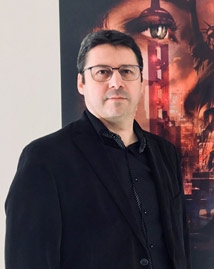

Christophe Bisson is a professor in the field of anticipatory systems at SKEMA since 2019. He teaches anticipatory and strategic systems, strategic and competitive intelligence, augmented intelligence and digital transformation, and strategic foresight. His research interests lie in the convergence of human and machine intelligence to augment decisions and related outcomes in a sustainable manner. He is currently investigating algorithmic and hybrid approaches for an augmented foresight.
Tell us about the PMFCFS project.
The project was funded in the framework of the 1st Futures Research Grant programme launched in 2020 by Prince Mohammad bin Fahd Center for Futuristic Studies (PMFCFS) in the Kingdom of Saudi Arabia (KSA) in association with the World Futures Studies Federation (WFSF), a UNESCO and UN consultative partner and global NGO. The aim is to explore and research Future Studies, with a pluralistic approach to contribute to the state of the art, foster collaborations in the field and eventually contribute to the development of KSA and society at large.
A multidisciplinary study was conducted to address strategic uncertainties by combining Human and machine intelligence hybridising strategy and A.I. to tackling big data and noise which are becoming a nuisance for companies, with devastating consequences. Companies are not only wasting vast amounts of their money on detecting irrelevant signals but are also forced into a false competition on mastering information. Such a phenomenon, if gone undetected, can unwittingly create occupational ‘blindness’ and ‘deafness’, allowing data issues to become a burden rather than an advantage.
What are the outputs and outcomes resulting from the project?
Organisations are flooded with data and former decision systems, that lead to decision paralysis especially after covid19. Therefore, there is great room for improvements in linking data to decisions and outcomes. The solution unifies not only human decision makers to technology but also to each other and integrates several disciplines that have been hitherto unnecessarily separated.
The results were presented in November 2020 at the IEEE (Institute of Electrical and Electronics Engineers) congress and published in September 2023 in Futures an academic journal ranked n°1 in the field of Foresight.
It triggered a great interest in the academic community on what was coined as Decision Intelligence. Yet, Gartner in a study in 2023 underlined that Decision Intelligence is one of the most topic for the next decade.
Furthermore, I was solicited in May 2023 to participate as a scientist in Decision Intelligence in a 3-day Forum, Earth System Predictability (ESP), organised by the University of Oxford, the European Space Agency (ESA) and Trillium Technology. The aim was to accelerate our understanding on how to make better decisions for the future of our planet by combining Earth Observation, AI and Decision Intelligence. Over 150 experts and scientists from NASA, NVIDIA, MIT and yet very few from France were gathered. A report was then drawn to pave the way for further actions, projects, as endeavours to tackle the challenges of climate urgency and sustainability.
How will this research project have an impact on the stakeholders and society at large?
The stake is to help companies organisations, and authorities to better link data to decision to be more competitive and sustainable and therefore maximise economic impact. We are currently engaging with potential identified organisations in the design of a value proposition.
You were granted several research fundings from various countries. What did you gain from it and how has this helped you achieve your goals?
I had the chance to receive funding from the US National Science Foundation (NSF) for which there is great competition, from the EU and other international funders to mainly support my research in action. This allowed me to obtain good quantitative data, foster collaborations with various stakeholders such as the French Ministry for Agriculture and the EU Environment Protection Agencies, to tackle global societal challenges and carry out my work with very good conditions.

